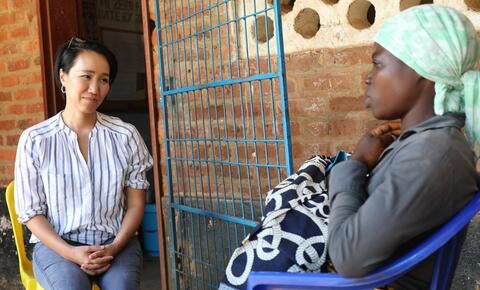Phalombe – MALAWI, Fasileni Kanyenga was in her eighth month of pregnancy. Each passing day, she was looking forward to a safe delivery at Chitekesa health centre in Phalombe district. Being her fourth pregnancy, she was aware of all the requirements for delivery and made sure they will be available come the day.
Three days of heavy rains destroyed and washed away all what she kept for hospital delivery. Their house fell and with the eight-month pregnancy, all she could afford to carry as she run away from the flooded house were few clothes. She could not even be able to rescue her blanket. With her husband and kids, they sought refuge at Mileme camp where they found their colleagues who faced a similar ordeal.
Fasileni is a monther of three and lives at Mileme camp in Phalombe district. Just like other camps with people displaced by floods, the life of a pregnant woman is very dire, stressful and inconvenient. “We sleep in the tent that is congested and it has been common among many of us to have a cough and sometimes feel restless” says Fasileni.
Having lost almost all her belongings, she feels empty. Her hopes of safe delivery are no longer there. She is anxious as to how her delivery will undergo this time. Even though her husband will take her on a bicycle to a health facility which is ten kilometers away from the camp, her anxiety lingers.
Sexual and reproductive health response.
Phalombe district safe motherhood coordinator, Alex Kamanga is aware that due to floods, most pregnant women lost their birth preparedness kit which includes a basin and wrappers (Chitenje) among other item. Additionally, nearby health facilities are under pressure because they see an increase in the numbers of people seeking services. “Due to the floods, health facilities close to camps record an increase in the number of people seeking services including pregnant women” he says.
In response to ensure safe deliveries and that no maternal deaths occur, UNFPA Malawi procured Reproductive health kits which were distributed to nine of the fifteen flood affected districts. The RH kits include individual clean delivery kits, equipment and medicines for assisted delivery, management of unsafe abortion among others.
“We brought in the RH kits to address preventable maternal neonatal deaths and support clinical management of gender based violence” says Won Young Hong, UNFPA Representative. “Women and girls are more vulnerable in emergencies and their specific needs are often ignored in crises. They need services for safe pregnancy and childbirth, and protection from gender violence. Securing their safety and ensuring their dignity and health promotes the well-being of families and communities”

Namitoso camp in Machinga district
Women and girls are more vulnerable in emergencies and their specific needs are often ignored in crises. They need services for safe pregnancy and childbirth, and protection from gender violence. Securing their safety and ensuring their dignity and health promotes the well-being of families and communities
Orientation of the services providers on the use and placements of the kits was done alongside the distribution. Joe Nkhonjera, Phalombe Nursing Officer was not aware of the contents of the RH kits before the training. “Actually, this is my first time to see reproductive health kits and their contents, I find them very appropriate for outreach clinics and managing deliveries at every level of health care” he says.
The RH kits were also delivered at Chitekesa health centre where Fasileni and her colleagues from Mileme camp will deliver their babies.
Flooding situation and response in Malawi
Malawi was declared a state of disaster on 8th March, 2019. According to the Malawi Floods Response Plan launched recently, close to USD25.6million has been mobilized for the flood response, leaving a gap of USD19.6 million. It is estimated that 868,900 people have been affected by the floods where about 217,224 are women of reproductive age, 56,650 adolescent girls and about 7000 deliveries were expected from March to May 2019.
Increased health needs and disease burden resulting from an influx of patients from camps and affected communities requiring care have been reported creating an impact on the district level limited resources thereby depleting the normal medical supplies and therefore creating shortage. Throughout the flood response period, one maternal death was reported in Nsanje district.
-henry chimbali-


